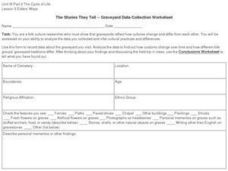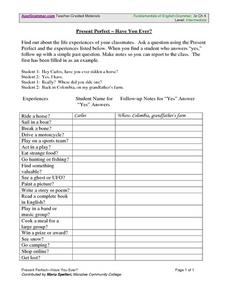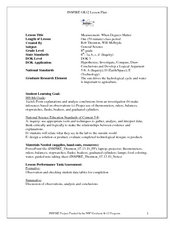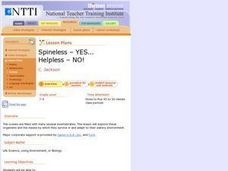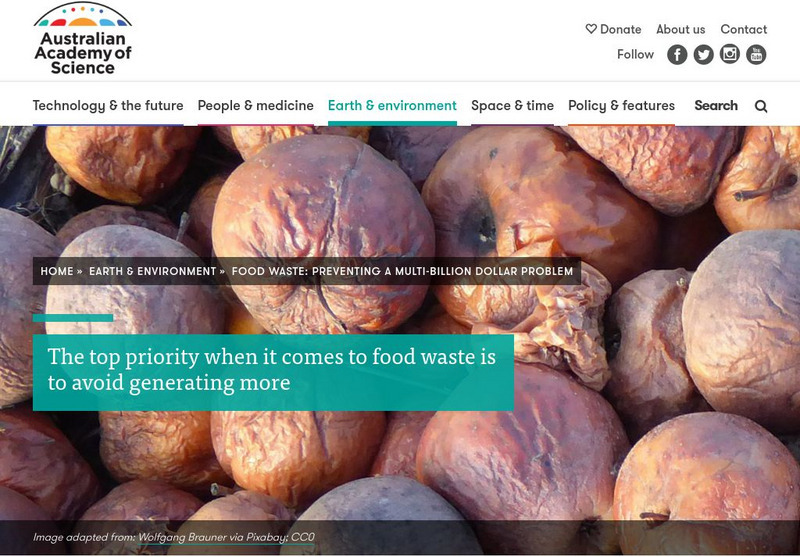Curated OER
Can You Count on Cans?
How can a canned food drive be connected to math? It's as simple as counting and organizing the cans! Children demonstrate their ability to sort non-perishable foods into categories that include soup cans, vegetable cans, boxed items,...
Curated OER
The Stories They Tell -- Graveyard Data Collection Worksheet
In this folk culture research worksheet, students use the form to record data about a graveyard that they visit to show that graveyards reflect how cultures change and differ from each other.
Curated OER
Present Perfect Verb Tense- Class Data Collection Activity
In this verb tense and data collection worksheet, students find out about the life experiences of their classmates. They ask questions using the present perfect tense and the suggestions in a chart on the page. They record the...
Alabama Learning Exchange
Light, Dry and Nutritious - A Look at Dehydrated Food
Fifth graders study dehydration and dehydration of foods. They measure the amount of water lost from fruits as they are dehydrated. They use desktop publishing software to design an advertisement for dehydrated fruit after researching...
Curated OER
Yummy Math
Young mathematicians use bags of Skittles to help them gain practice in graphing and organizing data. They work in pairs, and after they have counted and organized their Skittles, they access a computer program which allows them to print...
Curated OER
Can Photosynthesis Occur at Saturn?
Students identify the different requirements for photosynthesis to take place. In this space science lesson, students simulate conditions in Saturn to investigate if photosynthesis is possible there. They use data and observations...
ARKive
Biodiversity and Evolution – Darwin’s Finches
Teens experience natural selection firsthand (or first beak) in an activity that has them act as finches foraging for food. Using different household items to act as different beak styles, your little finches will collect as much...
Curated OER
Horatio's Ratios
View a PBS video entitled Horatio's Drive and explore Horatio's Ratios. Collaborative learners form groups to use Mapquest to determine distances covered. They generate the mathematical averages, ratios, and rates in order to calculate...
Curated OER
Shake, Rattle and Roll
Students compare the weathering of different-sized materials. Comparisons are made and data analyzed to reach conclusions about the process of weathering. Applications can be made for the higher grades.
Curated OER
The Heart Stopper
Use the pump from a spray bottle to drive a model of the heart in action! In addition to modeling the function of the heart and blood vessels, aspiring anatomists also simulate arterial blockage. They compare the effects of increased...
Curated OER
Water Lesson Plan
Students discuss the importance of water in our daily lives. In this physics instructional activity, students calculate the pressure of water tower systems. They investigate the effect of certain variables using a computer simulation.
Curated OER
Measurement: When Degrees Matter
Eighth graders record the temperature change of the beakers. In this general science lesson plan, 8th graders create their own data table for recording observations. They discuss experimental results and cite real life applications.
Alabama Learning Exchange
Plants, Soil and Nutrients
Young scholars conduct an experiment. They review how to use the scientific method to conduct an experiment with white carnations and food coloring. They create a hypothesis and test it to better understand how plants get nutrients,...
Curated OER
Native Americans
Learners, in groups, research various Native American tribes. They wirte a report about the tribe which includes information about their food and ceremonies, among other things. They create a diorama and a poster that shows how they...
Curated OER
Spineless - YES... Helpless - NO!
Students distinguish between invertebrate and vertebrate organisms while examining the zoological classes of a number of invertebrates. They illustrate a food web of these organisms and investigate the impact of humans on the oceanic...
Curated OER
Sea Ice Research
Students study sea ice and its importance in climate and climate change. They discuss sea ice as a presence of a food source for marine animals in the arctic and complete a lab activity. After completing the lab, they watch a video...
Curated OER
He Came Out Of Nowhere!
Young scholars calculate the traveled speed and distance of a robot. In this geometry lesson, students use the distance formula to manipulate and use to solve for the required variable. They calculate answers where two...
Alabama Learning Exchange
Air is All Around You
Pupils investigate the mysteries of air. In this science lesson, young scholars participate in hands-on activities that require them to use the scientific inquiry model to study air.
Other
Australian Acad. Of Science: Food Waste: Preventing Multi Billion Dollar Problem
The top priority when it comes to food waste is to avoid generating more. Food waste includes all food intended for human consumption that never reaches us, as well as edible food that consumers throw away. As it rots in landfills, food...

